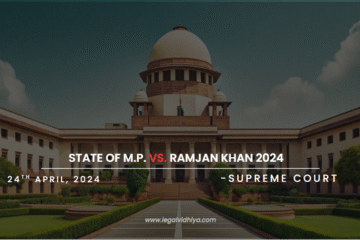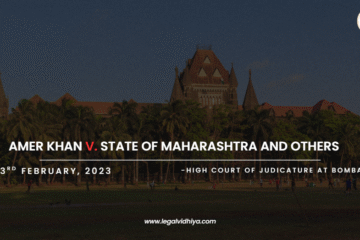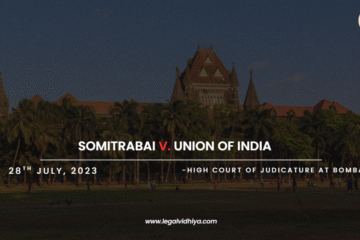
| CITATION | 2023 SCC 1227 |
| DATE OF JUDGMENT | September 27, 2023 |
| COURT | Supreme Court of India |
| APPELLANT | Phulel Singh |
| RESPONDENT | State of Harayana |
| BENCH | B.R. Gavai, P.S. Narasimha And Prashant Kumar Mishra, JJ. |
INTRODUCTION
In the matter at hand, the Appellant stands before this court seeking relief from a conviction rendered by the Hon’ble Trial Court and subsequently upheld by the Hon’ble High Court under Section 304-B of the Indian Penal Code. The case revolves around allegations of dowry-related harassment and the tragic death of the deceased. The Appellant contends that the convictions were unjust and raises compelling arguments, while the Respondent maintains that justice has been served. This court is tasked with a grave responsibility, and the following contentions and evidence shall be carefully examined to determine the justness and legality of the Appellant’s conviction.
FACTS OF THE CASE
- The Appellant and the deceased were married in March 1987, and they had a daughter and a son. The prosecution alleges that the appellant subjected the deceased to harassment due to insufficient dowry. It is further alleged that, in compliance with the appellant’s demands, the deceased’s parents paid Rs. 20,000 in cash in 1990, and also provided a scooter and gold ornaments weighing 2.5-3 tolas. The deceased frequently complained to her parents and brother about the appellant’s mistreatment and refused to stay at the appellant’s house. Despite assurances from Mohan Singh, the son-in-law of Jora Singh, the deceased’s father-in-law, the deceased continued to be mistreated by the appellant.
- Pavitar Singh (PW-3), the deceased’s brother, visited her matrimonial home in village Chatha approximately 3 to 4 days before Diwali in 1991. During this visit, the deceased informed him of dowry demands made by the appellant and his family. Subsequently, Pavitar Singh (PW-3) reported this harassment to his parents. In response, Randhir Singh (PW-4), the deceased’s father, approached Major Singh (PW-6), the Sarpanch of their village, who assured them of counselling the appellant’s family after Diwali. On November 5, 1991, the Diwali festival day, Dr. Sharma of Bhagwangarh conveyed that the deceased had suffered burns and was en route to Ludhiana.
- The Medical Officer at DMC, Ludhiana, who conducted the medico-legal examination on the deceased, determined that she suffered 91% burns. On November 7, 2011, when the deceased regained consciousness, she identified the appellant as the perpetrator of the burning to Pavitar Singh (PW-3) and others. This statement led to the filing of an FIR (Ex. P.E./1) against Jora Singh (father-in-law of the deceased), the appellant, and Dhan Kaur (mother-in-law of the deceased). The charges include violations under Sections 498-A, 307, 406, and 34 of the Indian Penal Code. On November 18, 1991, at approximately 6:00 p.m., Dr. Jatinder Pal Singh (PW-8) notified the Sarabha Nagar Police Station in Ludhiana of the deceased’s death through a written report.
- Following the investigation, a charge-sheet was filed in the jurisdictional Magistrate’s court. The trial court convicted all three accused individuals for the offense under Section 304-B of the Indian Penal Code (IPC) related to dowry death. They were sentenced to seven years of rigorous imprisonment and fined. However, the court acquitted them of the Section 302 IPC charge due to the benefit of doubt. The accused persons appealed to the High Court, but the conviction and sentence were upheld.
- Therefore, the Appellant has preferred the present case.
ISSUE RAISED
Whether the Appellant’s conviction by the Hon’ble Trial Court and High Court under Section 304-B of the Indian Penal Code was just and lawful?
CONTENTIONS OF APPELLANT
- The Appellent contended that both the Hon’ble trial court and the Hon’ble High Court committed serious errors in convicting the appellant. It is argued that relying on the dying declaration is legally unjustifiable. The initial statement made by the deceased to the doctor upon hospital admission indicates that she had applied kerosene to herself and self-immolated, with the appellant making efforts to extinguish the fire. Consequently, the subsequent dying declaration, recorded 3-4 days after the incident, should not have been considered by the courts. It is further asserted that the latter dying declaration was influenced by the deceased’s relatives and that a conviction solely based on it lacks legal merit.
- The Appellant stressed that there is no evidence to prove harassment of the deceased due to dowry demands. Even if the deceased’s relative’s statements are accepted at face value, they do not establish harassment. Additionally, independent witness Major Singh (PW-6), the village Sarpanch, does not support the prosecution’s case.
- The Appellant’s counsel relied on precedent such as Makhan Singh v. State of Haryana.
CONTENTIONS OF RESPONDENT
- The Respondent asserted that the prosecution had proven the case beyond a reasonable doubt. They argue that the dying declaration was recorded by an Executive Magistrate and that Dr. Jatinder Pal Singh (PW-8) confirmed the deceased’s sound state of mind for the statement. Therefore, they contend that the conviction based on this declaration should not be challenged.
- The Respondent contended that the testimonies of PWs 3 and 4, close relatives of the deceased, in conjunction with Major Singh (PW-6), the Village Sarpanch, unequivocally establish that the deceased endured harassment due to the non-fulfilment of dowry demands. Accordingly, the Respondent requests the dismissal of the current appeal.
JUDGEMENT
The Hon’ble Supreme Court, having considered the matter, allowed the appeal. The judgment and conviction rendered by the trial court on September 14, 1999, and upheld by the High Court in its disputed judgment on July 24, 2009, are hereby annulled. The appellant is exonerated from all charges, and his bail bonds shall stand discharged.
CONCLUSION
After careful consideration of the contentions presented by both the Appellant and the Respondent, the Hon’ble Supreme Court has allowed the appeal. The conviction of the Appellant by the Hon’ble Trial Court and High Court under Section 304-B of the Indian Penal Code has been declared unjust and unlawful. Therefore, the judgment and conviction have been annulled, and the Appellant is exonerated from all charges. This order results in the discharge of the Appellant’s bail bonds.
REFERENCE
- SCC Online
- Criminal Procedure Code, 1973
- Indian Penal Code, 1860
This Article is written by Raj Nagre student of New Law College, Mumbai; Intern at Legal Vidhiya.




0 Comments